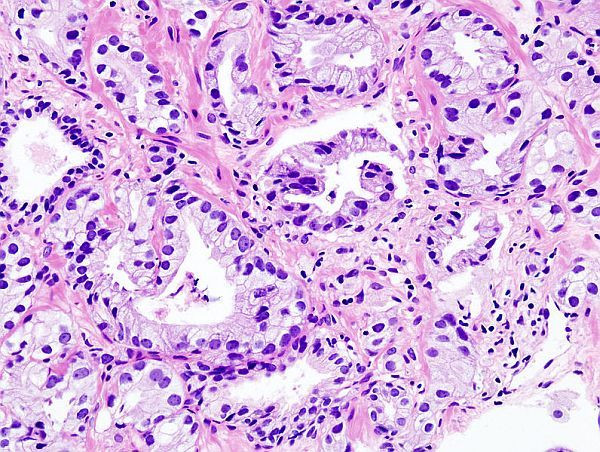Half Of Men Over 60 Have Prostate Cancer, But Most Die Of Other Causes

A new study looking at the prevalence of prostate cancer in men over 60 years of age found that just about 50 percent of men have the cancer. This statistic isn't as distrubing as it sounds; most prostate cancers never develop into a harmful form of the disease and a large proportion of men will pass away from other causes without their prostate cancer progressing and becoming invasive.
The current study, published in the Journal of the National Cancer Institute, examined 320 men from Russia and Japan who had died at the age of 60 or older between 2010 and 2011. None of the men had been diagnosed with prostate cancer before their death. Men from Russia were used for the survey because they have similar fat intakes and sun exposures compared to North American men. Japanese men were examined because the incidence of prostate cancer is lower in the male population of Japan, most likely resulting in different diet compared to Caucasian North American men.
According to the study's authors, the results of the research indicate that the testing protocols for determining the presence of prostate cancer is not sensitive enough to detect all forms of the disease. Typically, doctors perform a digital rectal exam on older male patients to feel for hard nodules in the prostate that would indicate a mass. Additionally, there is a prostate-specific antigen (PSA) test that can be taken in the doctors office which can indicate if a man has prostate cancer, as many prostate cancers produce extra PSA and elevated levels can be found in the blood.
How often men should be tested for prostate cancer is a topic of debate among healthcare professionals. After all, the bottom line is that most American men will get prostate cancer if they live long enough. But many of them never experience any ill effects from the cancer, and typically die of natural causes having nothing to do with the prostate. And in fact, many doctors believe that prostate cancer is over-treated because not all men progress to a dangerous form of the disease.
The researchers in the current study suggest that the clinical relevance of the PSA test should be reexamined because the proportion of men who had prostate cancer in the study far outpaced the number believed to have prostate cancer in the general population. According to the National Institutes of Health, 240,890 Americans are diagnosed with prostate cancer each year.
Source: Zlotta A, Egawa S, Pushkar D, et al. Prevalence of Prostate Cancer on Autopsy: Cross-Sectional Study on Unscreened Caucasian and Asian Men. Journal of the National Cancer Institute. 2003.



























